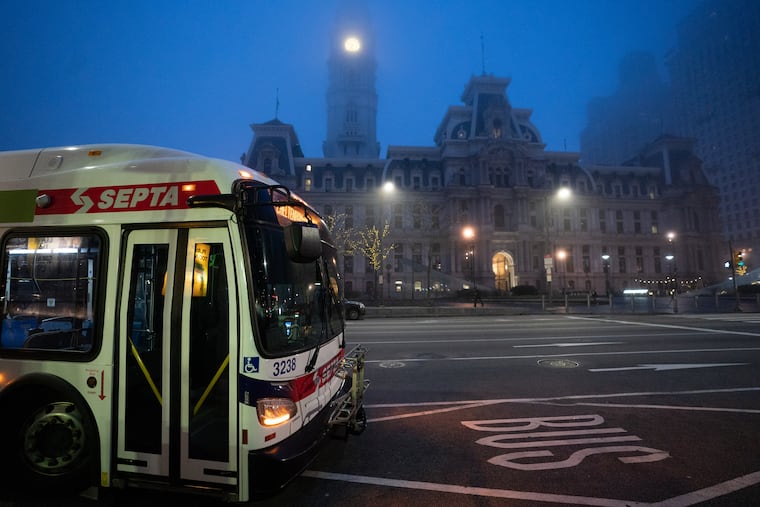‘Mounting’ losses prompt SEPTA to cut exec pay, eliminate overtime, consider further service reductions
The transportation agency now projects at least a $150 million loss for this fiscal year, ending in June. SEPTA General Manager Leslie Richards called the steps “difficult short-term measures.”

Faced with plummeting ridership and service reductions amid the coronavirus crisis, SEPTA is taking steps to mitigate “mounting operating losses” while it awaits possible federal relief funding for transportation agencies across the nation.
SEPTA has instituted a 10% pay reduction for General Manager Leslie S. Richards and its executive team, effective immediately, Richards wrote in a letter sent to employees Friday. Other “cost-cutting measures” have been or will be put into place, “including elimination of overtime, a freeze on new hires, eliminating marketing efforts where possible, eliminating nonessential employee travel," while it also weighs additional service reductions on Regional Rail and other forms of transit.
Richards called the steps “difficult short-term measures" as the situation poises the transportation agency to project at least a $150 million loss for this fiscal year, ending June 30. The agency had been working with a $7.3 million surplus in the months prior.
“Together, we will get through this," Richards said in her letter. "Please stay safe and know that your health and well-being and that of our customers is always my priority.”
Pennsylvania lawmakers, too, are calling upon congressional leadership to provide emergency supplemental funding for public transportation.
In a letter from 10 Pennsylvania members of the House and Sen. Bob Casey (D., Pa.) dated Friday, officials urged Senate and House leaders to consider public transportation needs as it plans the allocation of federal recovery funds. In the letter, they noted “the financial impact of the outbreak on SEPTA’s operations will be devastating.”
“Gov. Wolf’s order to close all non-life-sustaining businesses guarantees heightened and sustained ridership and revenue losses that are not just an immediate threat, but if not addressed now will impact SEPTA’s ability to provide critical mobility once recovery and safe and reliable public transportation will be needed most,” the letter reads. “SEPTA’s operating funding shortfall is not of SEPTA’s making.”
The call comes from Democratic Reps. Dwight Evans, Matt Cartwright, Brendan Boyle, Chrissy Houlahan, Madeleine Dean, Mary Gay Scanlon, Conor Lamb, and Mike Doyle, and Republican Reps. Brian Fitzpatrick and Lloyd Smucker.
Wolf issued a mandatory shutdown order for all businesses that aren’t “life-sustaining” Thursday, a step further from the statewide shutdown seen earlier. The measures aim to keep Pennsylvanians at home in an effort to “flatten the curve" as the region sees growing cases of the coronavirus.
SEPTA’s ridership has taken a nosedive as more people heed calls for social distancing, with ridership down 64% on transit and 88% on Regional Rail. Richards called the ridership losses “staggering” in the letter to employees Friday.
Ridership and staffing issues prompted SEPTA to make changes to its Regional Rail schedules earlier this week. Reduced service for its buses, subways, trolleys, and Norristown High Speed Line begins Sunday.
The agency has a $1.49 billion operating budget for fiscal year 2020 and is expected to soon unveil an operating proposal for the coming year. Fare-box revenue and state subsidies largely cover SEPTA’s operating costs, which include maintenance and labor.
The letter signed by Pennsylvania lawmakers highlighted the American Public Transportation Association’s call for $16 billion in direct emergency funding to sustain transit agencies balancing a rise in cleaning costs to mitigate the spread of the coronavirus as well as the drops in ridership. NJ Transit and New York’s Metropolitan Transportation Authority are seeking bailout funds.
PATCO, run by the Delaware Port Authority between Philadelphia and South Jersey, also has seen dramatic falls in ridership and has made its own schedule modifications.
The lawmakers’ call wasn’t exclusive to SEPTA. It also pointed to the Port Authority of Allegheny County and Beaver County Transit Authority, which both “face significant financial harm as a result of decreased ridership stemming from COVID-19.”
“Pennsylvania and the nation need strong and reliable transit systems, especially when this crisis ends and people will be returning to work, school, and normalcy,” the letter reads. “We look forward, then, to working with you to secure emergency supplemental funding to ensure transit agencies have the financial resources necessary to serve their communities today and into the future.”
Greg Krykewycz, associate director of multimodal planning at the Delaware Valley Regional Planning Commission, called such high drops in ridership “a shock to the system.”
A loss in ridership to that degree would be “severe” for any transit system, he said.
“If fare-box is down even 10%, even 20%, that can be a huge dent in revenue that a transit agency is counting on, because they plan out over the course of a fiscal year and make sure they have a balanced budget," Krykewycz said. “And if they get an unexpected dent like that, they have to make up for it someplace else.”